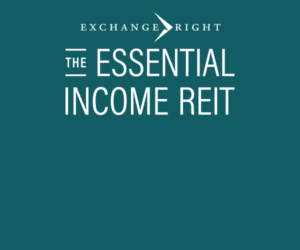Zero Cash Flow Properties: What Are They and How Can They Be Beneficial to Property Owners?
March 31, 2021 | Inland Real Estate
 Industrial distribution centers, necessity-based retail centers and corporate office headquarters with long-term, triple-net leases and investment-grade credit ratings are examples of properties that may utilize a zero cash flow structure. Often referred to as “zeros,” these properties are highly leveraged with a loan-to-value ratio (LTV) ranging between 80% and 90%. They require a minimal equity down payment for acquisition and are structured so that all net operating income (NOI) is paid to the lender in the form of principal and interest payments, until the principal balance of the loan has been satisfied in full.
Industrial distribution centers, necessity-based retail centers and corporate office headquarters with long-term, triple-net leases and investment-grade credit ratings are examples of properties that may utilize a zero cash flow structure. Often referred to as “zeros,” these properties are highly leveraged with a loan-to-value ratio (LTV) ranging between 80% and 90%. They require a minimal equity down payment for acquisition and are structured so that all net operating income (NOI) is paid to the lender in the form of principal and interest payments, until the principal balance of the loan has been satisfied in full.
A zero can be particularly beneficial to a property owner that is selling a property with a large amount of debt as a percentage of total sales price and that is seeking to complete a 1031 like-kind exchange. Section 1031 of the Internal Revenue Code allows real estate investors to defer the payment of capital gains taxes that could arise from the sale of a business or investment property. Federal income taxes may be deferred by using the proceeds of the sale to purchase “like-kind” real estate, as long as certain conditions are met.
When completing a Section 1031 exchange, the sum of the cash invested, and the debt placed on the replacement property, must be equal to or greater than the sum of the cash invested and the debt relinquished on the property being sold. Investor demand for an outsized LTV may arise for a myriad of reasons. It may be that a property owner took advantage of low interest rates, refinancing their rental property several times, in each instance increasing the loan amount, and thereby reducing their equity in the property that was sold. Alternatively, it could be that the relinquished property lost value, resulting in a reduced amount of equity proceeds available for reinvestment. While both of these examples are very different, the end result is the same – they both create potential demand for a zero.
Meeting the debt requirement for a 1031 like-kind exchange is not always easy. Zeros, specifically in those owned by Delaware Statutory Trusts (DSTs), provide investors with a vehicle to satisfy high debt replacement requirements, while attaining equity growth and capital preservation through ongoing principal paydown of the loan balance.
A zero provides an exchanger with the opportunity to strategically acquire a position in an institutional-grade property with minimal equity. The ability to assume high LTV, non-recourse financing in a turnkey zero transaction may be of interest to 1031 investors as well as cash purchasers with the same objective. The tax benefits can be considerable for both investors, but can vary significantly, dependent upon an investor’s cost basis at the time the investment is made.
Additional advantages of zeros include tenant assumed management duties, the ability to offset and reduce tax liability generated elsewhere in a portfolio through annual passive losses and an in-place loan acquisition structure in which the investor assumes long-term, non-recourse, fixed rate financing. It also can address a consistent market need as most 1031 exchanges require both an equity or debt requirement that a zero may help fulfill.
It is important for those interested in zeros to identify assets that are considered mission-critical facilities, occupied by tenants with strong financials and investment-grade credit. Assets fulfilling this criteria are essential as lenders work diligently with both landlords and developers in securing first mortgage financing that aligns with monthly rent and mortgage installments.
A zero is both a real estate investment and an investment in the underlying financing that requires credit analysis, real estate underwriting and financing execution. That being said, it takes time, patience and careful analysis to find attractive opportunities.
This once niche segment of the commercial real estate market has grown substantially, particularly in the DST market. For example, Inland Private Capital Corporation has syndicated more than $1 billion in transactions structured as zeros with a number of Fortune 500 tenants.
Anyone seeking to complete a Section 1031 exchange, including through a zero, should consult their tax advisor for additional requirements surrounding their specific transaction. For 1031 investors, however, the structure has been a valuable tool in covering a high LTV need in the purchase of their replacement property.
The information provided here is not investment, tax, or financial advice. You should consult with a licensed professional for advice concerning your specific situation.











